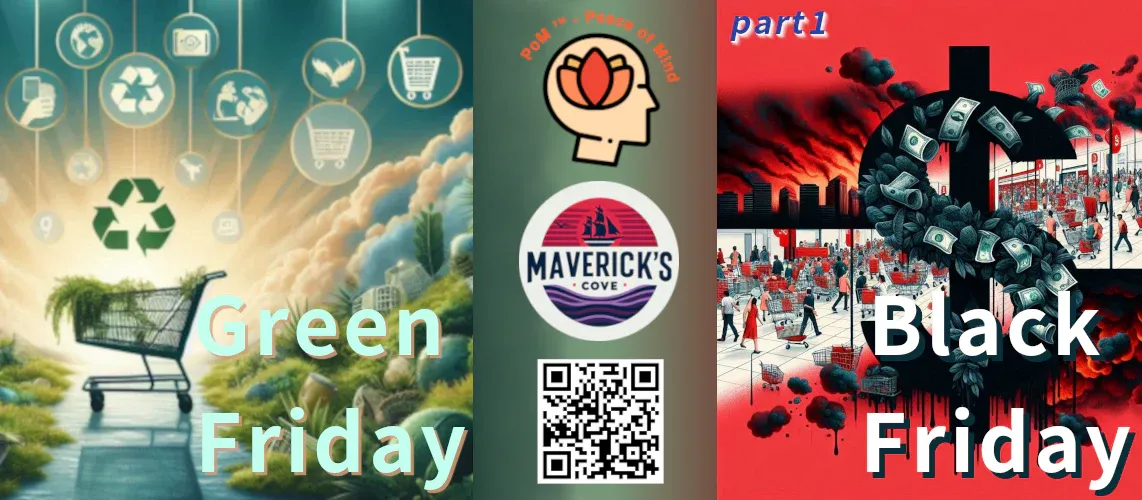The Dark Side of Black Friday: A Frenzy with High Costs – Exploring Alternatives ...

DigitPaxM-06112024. - Black Friday (on coming 29th November 2024), the day after Thanksgiving in the United States, has become synonymous with deep discounts and shopping frenzies. But beneath the allure of bargains lies a darker side, with far-reaching consequences for consumers, businesses, workers, and the environment.
With our today's article you can get an insight, why PoM - Peace of Mind ... Happy Life! as Eco-brand which stands for Slow Fashion and targets at a Circular Economy is not participating actively in any promotion of its collections for Black Fridays or Cyber Mondays in 2024 or in the future.
part 1: Understanding the Impact of Black Friday
The Evolution of Black Friday
The term Black Friday originated in 1950s Philadelphia, where it described the chaos following Thanksgiving as crowds flooded the city for holiday shopping. By the 1980s, retailers rebranded the term to mark the beginning of the holiday shopping season, offering massive discounts to attract customers.
With the advent of the internet and e-commerce, Black Friday has evolved into a global phenomenon. Events like Cyber Monday have extended the shopping frenzy into a multi-week extravaganza. In 2023, global Black Friday online sales reached $70.9 billion, a testament to the event’s dominance. AI-driven marketing tactics now personalize shopping experiences, further intensifying consumer behavior.
The Hidden Costs of Black Friday
1. Consumer Risks
While discounts seem enticing, they come at a personal cost. Limited-time offers and the fear of missing out (FOMO) often drive impulsive purchases, leading to overspending and debt. In 2023, the average consumer spent $321.41 during Cyber Week, with many delaying necessary purchases in anticipation of discounts.
2. Retailer Pressures
For businesses, Black Friday is a double-edged sword. Although it generates revenue, small businesses struggle to compete with retail giants offering deep discounts. Reduced profit margins and aggressive competition often jeopardize the sustainability of smaller players.
3. Worker Exploitation
The surge in demand exacerbates pressure on retail and logistics workers, who endure long hours, unfair wages, and poor working conditions. The "Make Amazon Pay" protests, active across 20+ countries, highlight widespread dissatisfaction with labor practices during the peak shopping season.
4. Environmental Damage
Black Friday’s environmental footprint is staggering. Excessive production, transportation, and packaging generate substantial carbon emissions. In 2020, Black Friday in the UK alone resulted in 429,000 metric tons of CO2—equivalent to 435 return flights between London and New York. Additionally, 80% of Black Friday purchases reportedly end up in landfills, contributing to waste and pollution.
A Global Shift: Counter-Black Friday Movements
Countries like France have pioneered initiatives like Green Friday, which promotes sustainable shopping habits and eco-friendly practices. Businesses such as Patagonia and IKEA have embraced alternative approaches, such as donating profits to environmental causes or reselling pre-owned items. These efforts underscore the growing demand for responsible consumption.
part 2: Mitigating Black Friday’s Environmental Consequences
The staggering levels of waste, carbon emissions from shipping, and discarded packaging leave a lasting imprint on our planet by Black Friday and Cyber Monday promotions.
But it doesn’t have to be this way. By adopting mindful shopping habits and prioritizing sustainable practices, we can still enjoy the benefits of Black Friday without compromising the environment.
From choosing eco-friendly retailers to rethinking our approach to consumption, there are actionable steps we can take to make a positive impact.
Let’s explore how small, thoughtful changes can help mitigate the environmental consequences of this global shopping event.
1. Changing Consumer Behavior
- Buy Less: The simplest way to reduce waste and emissions is to purchase fewer items.
- Buy Used or Local: Opt for secondhand goods or support local businesses to minimize environmental impact.
- Choose Sustainable Alternatives: Participate in initiatives like Green Friday, Giving Tuesday, or Buy Nothing Day, which emphasize mindful consumption.
2. Encouraging Sustainable Business Practices
- Ethical Production: Businesses can adopt fair wages, sustainable materials, and transparent practices to reduce their environmental footprint.
- Eco-Friendly Packaging: Using recyclable materials or offering reusable packaging can significantly reduce waste.
- Local Fulfillment: Offering local pickup options minimizes transportation emissions.
3. Advocating for Policy Changes
- Regulation: Governments can limit excessive advertising and promotions during Black Friday to curb overconsumption.
- Carbon Taxes: A tax on emissions could incentivize companies to adopt greener practices and invest in sustainable solutions.
Conclusion: A Call for Mindful Consumption
Black Friday symbolizes the challenges of consumerism and its far-reaching consequences. However, alternatives like Green Friday and sustainable shopping practices offer a path forward, fostering a shift toward environmental consciousness and responsible spending.
Both consumers and businesses play pivotal roles in reshaping the future of retail. By prioritizing mindful consumption, we can mitigate the negative impacts of Black Friday and promote a more sustainable and ethical approach to holiday shopping.
---------------------------
Small Fact Check ...
Black Friday negatively impacts environmental sustainability globally due to over-consumption and increased shipping and packaging in numbers:
- About 80% of Black Friday purchases end up in landfills after a short lifespan. Black Friday sales encourage consumers to buy more than they need at discounted prices, often leading to products being discarded after minimal use.
- The increased demand for products during Black Friday results in a surge in manufacturing, which consumes energy and resources. Millions of tonnes of resources are used to manufacture and ship products for the Black Friday sales.
- The fashion industry is responsible for about 10% of global CO2 emissions, and Black Friday sales further contribute to this by promoting fast fashion. Consumers are tempted by heavily discounted items and purchase clothes in vast quantities, which depletes renewable resources and drives unsustainable agriculture practices.
- The transportation of goods purchased during Black Friday results in a significant increase in greenhouse gas emissions. Deliveries from Black Friday sales in the UK alone are estimated to generate over 429,000 metric tons of CO2, equivalent to the emissions from 435 return flights between London and New York.
- Online shopping contributes to increased carbon emissions due to the fuel consumption of delivery trucks and the energy consumption of data centers. Excess packaging, primarily non-biodegradable plastic, adds to the environmental burden.
- An estimated 900,000 extra parcels were sent out over Black Friday weekend in 2022. This increase in shipping leads to a corresponding increase in packaging materials used, with most of it ending up in landfills.
- In 2023, Black Friday online sales in the UK alone reached £4.81 billion, leading to a significant increase in packaging waste and carbon emissions from deliveries.
Our Sources, Reference List (A-Z):
Here is a list of all the sources that have been used so far for our article. The sources are listed in alphabetical order by title ...
- 171 Black Friday Statistics Every Retailer Should Know 2024, Year: 2024 with Cross Reference: "How Currys Used Queue-it to Handle Over 1 Million Black Friday Shoppers".
- 7 tips for Christians to shop responsibly on Black Friday, Year: 2024, Publisher: Biblescripture.net
- Allianz | From Cyber Monday to Black Friday: how the retail sector is navigating year-round challenges
- Amazon workers plan global protests on Black Friday, Cyber Monday, Publisher: FreightWaves
- Americans adopt financial strategies to avoid sliding into debt, Author: Sanjana Feroz, Year: 2023, Publisher: The Wash
- Beware Black Friday’s short-term gain could be Long-term financial pain.
- Black Friday 2022: How do sales impact the environment?, Publisher: SBS News
- Black Friday 2023 Report – How bad is it for the environment?, Publisher: Reuseabox
- Black Friday BNPL risk: 16m Brits unaware of debt dangers, Publisher: FinTech Global
- Black Friday Is Rubbish, Author: Fredrika Stigell, Year: 2024. Publisher: B&T
- Black Friday riddle: Consumers are financially stressed, but still spending, Publisher: Marketplace
- Black Friday Shopping: Smart Strategies to Avoid Debt
- Black Friday spending expected to be subdued, Year: 2024, Publisher: The Mail & Guardian
- Black Friday Stats 2024: Trends & Consumer Expectations, Year: 2024, Publisher: Sinch
- Black Friday and The Perfect Consumerism Trap/ Buying items, no matter how small, just because they are cheap contributes to climate change, feeds our mountains of waste and depletes our planet of its resources, Year: 2024, Publisher: Reddit (r/sustainability)
- Consumers urged to be cautious when spending for Black Friday, Publisher: IOL (The Mercury)
- Debt Risk For Shoppers This Black Friday, Year: 2024, Publisher: moneyfactscompare.co.uk
- Debt threat closes in for Black Friday bargain hunters, Year: 2024, Publisher: moneyfactsgroup.co.uk
- Fed up with Black Friday? Let's make it Green Friday instead!, Publisher: Green Friday
- French Merchants Boycotting Black Friday - Here is why!, Author: Dilyana Simeonova, Year: 2024
- Green Friday - Turning Black Friday Green
- How Black Friday impedes the fight for sustainability
- How the Rise in Online Shopping Affects the Planet, Year: 2019, Publisher: Wellesley College
- Impact of Detergents on the Environment [The Negative Effects], Year: 2024, Publisher: Kind Laundry
- Is Black Friday Bad For The Environment?, Publisher: WasteManaged
- New Study Reveals States with Highest Consumer Debt as Holiday Spending Surges, Publisher: MarketWatch Guides
- Overconsumption and the True Environmental Impact of Black Friday and Cyber Monday
- Should Black Friday Be Stopped? Here's What Environmental Experts Think
- Stop the environmental destruction of Cyber Monday, Publisher: The Diamondback
- The Dangers of Black Friday Shopping, Publisher: Trantolo Law
- The Ecological Impact of Black Friday, Year: 2024, Publisher: Go Forest
- The environmental impact of Black Friday, Publisher: Sustainable NI
- The Environmental Effects of Black Friday, Publisher: Techbuyer with Cross References to the "IT Lifecycle"
- The Environmental Impact of Black Friday, Year: 2021, Publisher: EarthPlex.
- The Environmental Impact of Black Friday and Cyber Monday: Green Is the New Black. Publisher: TreeEra
- The Environmental Impact of Sunglasses & How SmartBuyGlasses’ Black Friday Deals Contribute to Sustainable Shopping, Publisher: Mountain West Wire
- The Harm of Black Friday Shopping, 2024, Publisher: Planet Protein, Inc.
- Unpacking online shopping’s environmental impacts, Publisher: David Suzuki Foundation
- Why Big Fashion's Black Friday Is Harming Us All, Publisher: Atmos with Cross Reference to a petition titled "Speak Volumes".
- Why Black Friday Could Be Bad For The Environment?, 2024, Publisher: Aspioneer - Cross reference: "Cost-Effective Solutions for Bulk Liquid Transportation".
- Why Black Friday Is Bad, Publisher: GreenMatch
- Why Black Friday Is Bad: Uncovering the Downsides of Holiday Shopping, 2024, Publisher: Sustainable Review
+++




Comments ()